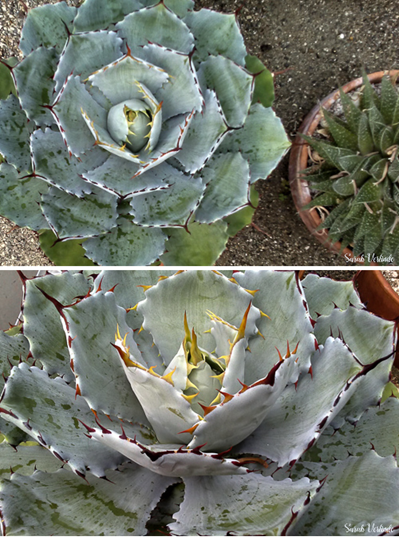Artichoke agave
Agave parryi var. truncata – Artichoke agave
Morphology
A blue/grey succulent with reddish-brown tips/spines at the top of the leaves that form a rosette. It has a thick waxy cuticle/
Plant Growth

Grows to be 2 to 3 feet tall and 3 to 4 feet wide. Plant matures into reproductive age and flowers in 10 to 30 years. When flowering, a red and yellow flowering stalk grows, up to 20 feet tall.
Distribution
The artichoke agave is native to Mexico, near the Durango/Zacatecas border.
Habitat
Artichoke agave excel in full sunlight and rocky soils that drain well.
Reproduction
Artichoke agave reproduce through seeds and are pollinated by insects. They also reproduce asexually, sending out new shoots very close to the mature plant. It’s roots/corms can also be divided.
Ethnobotanical Uses
Agave has been used as a natural diuretic, as well as a digestive aid. Agave tea was used to treat constipation, gas, and arthritis. The Aztecs mixed agave with salt to treat wounds, taking advantage of its anti-microbial properties. It’s active ingredients are also found in many topical ointments to kill bacteria. Agave naturally contains insulin and may decrease fat and cholesterol in the body.
Food Uses
Agave has been used as a sugar alternative sweetener and a source of fiber for the Native Americans. A close relative Agave tequilana is used to make tequila.
Resources
- “Agave.” Alternativ. Alternativ, 7 Feb. 2013. Web. 10 Aug. 2015.
- “Agave Parryi var. Truncata.” Llifle.com. Llifle, 14 Nov. 2005. Web. 10 Aug. 2015. http://www.llifle.com/Encyclopedia/SUCCULENTS/Family/Agavaceae/17367/Agave_parryi_var._truncata
- “Parry’s Agave.” Prescott Valley Nursery. N.p., n.d. Web. 10 Aug. 2015. https://prescottvalleynursery.com/shop/succulents/parrys-agave-agave-parryi
- “Agave parryi var. truncata.” Dave’s Garden. 25 July 2019. https://davesgarden.com/guides/pf/go/62776/#b .
This article was contributed by Stuart Haslam (BBIO 220 SUM’15) and Sarah Verlinde. For questions regarding the UWB/CC Plant Tour, contact Sarah at severlin@uw.edu.
